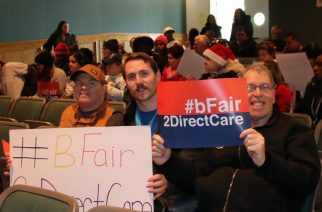
Our family has been farming in upstate New York for generations. We take great pride in helping to feed our community, taking care of the land that we farm and protecting the natural resources that have sustained us over the years. While much of what we do daily on the farm has roots in the work of generations past, there have been huge strides in innovation and the way we work has evolved. Thanks to new technology and precision practices, we can do more with less, yet we still need a variety of tools to ensure that we can keep pests and disease managed. Farming is precise and complex, and the decisions I make each and every day reflect the importance of my family’s health and the continued viability of my farmland. This is why it’s discouraging that New York lawmakers are considering a ban on an invaluable product that is used to help protect our crops and livelihood.
Currently, lawmakers in Albany are considering proposals that would ban an important tool and pesticide that protects some of our state’s most significant and popular fruits and vegetables. The proposed ban on chlorpyrifos would have far-ranging and potentially devastating effects to crops on my farm and those across the state.
Chlorpyrifos is an integral tool in the control of the cabbage and onion maggots, two destructive pests that severely damage cabbage, brussels sprouts, radishes, onions, garlic and shallots. Farmers must protect their crops from several types of these maggots each year. Chlorpyrifos provides excellent control when properly timed before periods when the flies lay their eggs. Since the application of chlorpyrifos is precisely applied and only at specific times when the crop is susceptible, human and environmental exposure is limited. As part of our ongoing integrated pest management system, chlorpyrifos is used in rotation with other products to avoid building resistance in the pest population.
In an unpredictable and challenging farm economy, farmers are facing a myriad of issues, from climate and weather shifts, labor, unpredictable commodity costs and trade, we operate on razor thin margins and rely on regulated and science-backed tools to manage some of these challenges. We encourage policies that rely on the science and expertise of state and federal agencies, and that state decision makers continue to support New York farmers to stay competitive and viable in such challenging times.
The problem with banning any control is that we don’t know what future implications and applications could be needed, much less undermining the regulatory framework. We need to look no further than our neighboring state of Pennsylvania — where in the last few years, an infestation of the Spotted Lanternfly has devastated vineyards and orchards. Growers and researchers in Pennsylvania are racing to find a solution and have invested in research of products to manage this rapidly expanding invasive species. Initial research has indicated chlorpyrifos could potentially be a tool used to manage the eggs and larva of this insect, helping decrease the spread of this devastating insect. We will be fighting Spotted Lanternfly in New York and we may need chlorpyrifos to effectively fight this pest.
Already, New York is unique in that it goes an extra step beyond the recommendations of the federal government with additional state agency review, monitoring and regulating pesticides. This dual layer of regulation should give consumers and state lawmakers additional reassurance that the application and use of pesticides like chlorpyrifos is safe and responsibly done. Because of the work done by the state Department of Health and the Department of Environmental Conservation, growers in New York are among the most responsible when it comes to pesticide use and application. Banning chlorpyrifos through this proposed legislation would undermine the professional, scientifically grounded process that currently serves our state.
As a farmer, I hope to see Albany work to provide funding and pass laws that help our local farmers, not remove tried and tested tools important to protecting our crops, land and viability. Just as my family farm has been passed down through generations, we need to do all we can to preserve the rights of farmers to use all the tools available to them to continue serving their community and being stewards of the lands for future generations.
Brian Reeves is a farmer in Baldwinsville and President of the NYS Vegetable Growers Association.
Brian Reeves
Baldwinsville









